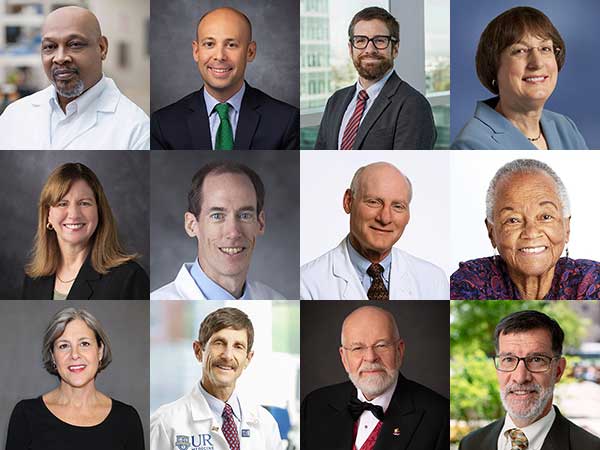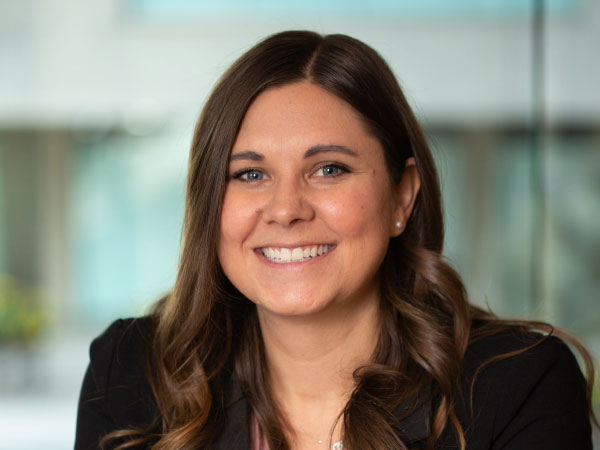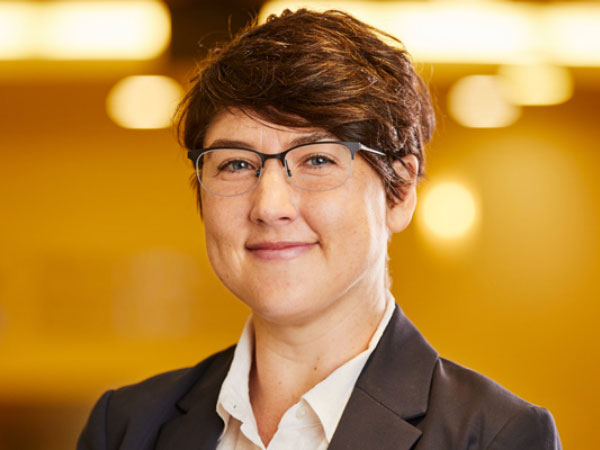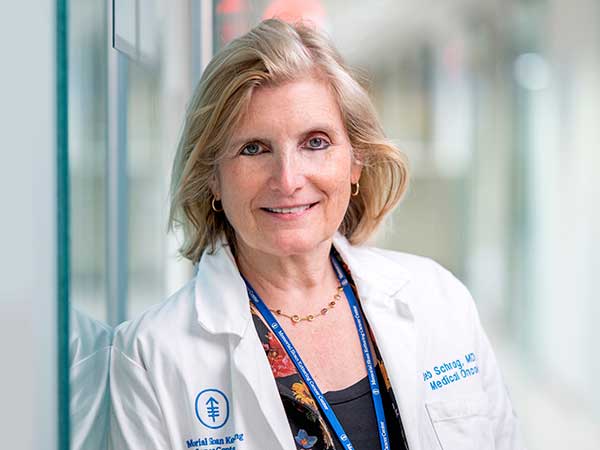“Patients are counting on us, and this remains the best time to be involved in cancer research,” W. Kimryn Rathmell said to The Cancer Letter.
This episode is available on Spotify and Apple Podcasts.
Rathmell spoke with The Cancer Letter’s Paul Goldberg on her first day as CEO of The Ohio State University Comprehensive Cancer Center – Arthur G. James Cancer Hospital and Richard J. Solove Research Institute.
“We can now study, in patients, things that previously before we could only try to guess at that,” Rathmell said. “There are discoveries we can make in real time that will change and impact patients like next year and the year after, not decades from now, not in another generation.”
In this episode of In the Headlines, Paul Goldberg, editor of The Cancer Letter, and Jacquelyn Cobb, associate editor, call in from the American Society of Clinical Oncology annual meeting to discuss the happenings at the meeting, Paul’s conversation with Rathmell—and FDA’s empty booth.
Rathmell encouraged young investigators to stay the course.
“Money may be scarce, but the ideas are not,” Rathmell said. “There are great ideas out there. I would encourage anyone who is interested in this career path to really double down. Really, the boldest ideas are the ones that are going to be funded, and to do innovative work and to be enthusiastic about the work that they’re doing.”
Stories mentioned in this podcast include:
- We catch up with Kimryn Rathmell on her first day as CEO at OSUCCC – James
- Pfizer seeks to improve breast cancer outcomes in Sub-Saharan Africa With help from Conquer Cancer’s EveryGrant and ASCO’s Sub-Saharan Africa Regional Council, Pfizer awards grants to seven countries
- The other side of the patient portal: Reflections from a cancer center leader, writes Ruben Mesa
- Boris Pasche: Surviving cancer is often not a patient’s most challenging battle
- A farewell post by an unidentified NCI employee triggers an accusation of “undermining the Trump administration”
This episode was transcribed using transcription services. It has been reviewed by our editorial staff, but the transcript may be imperfect.
The following is a transcript of this week’s In the Headlines, a weekly series on The Cancer Letter podcast:
Jacquelyn Cobb: This week on The Cancer Letter Podcast…
Paul Goldberg: We haven’t heard from patients yet. I know it’s just beginning, this period of whatever this period, whatever you want to call it. We truly haven’t heard patients say, “Hey, this has hurting me,” and I think it’s probably time.
Kimryn Rathmell: Well, this is where the community outreach engagement is important, to be hearing from patients, hearing from communities, understanding where their pain points are, knowing where any of what we’re doing is impacting people, either on an individual level or community level. Creating those kinds of conduits, so that we can hear from people, is super important.
Paul Goldberg: You are listening to The Cancer Letter Podcast. The Cancer Letter is a weekly independent magazine, covering oncology since 1973. I’m your host, Paul Goldberg, editor and publisher of the Cancer Letter.
Jacquelyn Cobb: And I’m your host, Jacquelyn Cobb, associate editor of The Cancer Letter. We’ll be bringing you the latest stories, groundbreaking research and critical conversations, shaping oncology.
Paul Goldberg: So, let’s get going.
Jacquelyn Cobb: How’s it going, Paul?
Paul Goldberg: Great, great, great. ASCO is always fun. The annual meeting, it’s great to wander around and talk to old friends and make new friends, and this is really confidential, so please do not pass it on to anybody else who isn’t watching this podcast, but on Mondays after ASCO, The Cancer Letter tradition is to go to the Art Institute and just play hooky. We’ve been doing it for years, and if you want to join us, just text either one of us next year and you can join us.
Jacquelyn Cobb: I will walk us through last week’s headlines. We had a little bit of a lighter week, which was really lovely, after a crazy couple of months.
Paul had a really, really engaging conversation with Kimryn Rathmell at the end of her first day on the job as the new CEO of OSU CCC James. In the Q&A, she reflected on her decision to take this job as the CEO and compared her first day to drinking out of a fire hose. She also reflected a little bit about her essay series that she did with us so the conversation with Paul is, like I said, really wide-ranging and engaging. Definitely worth checking out.
Claire wrote a piece about Pfizer grants to sub-Saharan African regions with the assistance from Conquer Cancer’s Every Grant, an ASCO foundation and ASCO’s Sub-Saharan Regional Council. These grants aim to support projects across seven countries throughout the region where breast cancer is the most commonly diagnosed cancer among women. The grants totaled more than $900,000.
We also had a guest editorial from Ruben Mesa about his experience with, basically, a diagnosis of nodular basal cell carcinoma, Mohs surgery, and his reflections on being on the other side of the doctor-patient equation.
Finally, we had a guest editorial by Boris Pasche about cancer survivorship, and how oftentimes enduring cancer treatment isn’t the hardest part of the cancer journey, but actually the mental, emotional, and sometimes physical toll that endures after surviving cancer, need more support and attention, so that’s sort of the wrap up.
Of course, Cancer Policy is always chock-full of stuff.
Paul Goldberg: The most interesting thing at this meeting, for me, there were so many interesting things, but one of the things that journalists get paid to do, which is notice what’s out there, so the thing that was chilling to me was the FDA exhibit in the ASCO exhibit hall, it was empty. It was just black cloth and nothing that even said FDA. I think there was a sign for a while, but there was nobody from FDA. NCI was even more disturbing, because there was just no NCI exhibit. This is the first time, really, that I can remember, and I’ve been doing this for a long time, that FDA or NCI wouldn’t be there.
There’s a symbol to this, NCI having a big booth there, because NCI is at the center of it all. It coordinates cancer research. Everything that gets done somehow reflects on NCI or if NCI reflects on whatever is being done, and there was no one there because there was no communication staff. In fact, there were no NCI employees there, so if there were any, it was a matter of exception. So, very strange ask in that way. On the other hand, their place was abuzz, as it always is when you put, what is it? 40,000 or so people in one convention center, and they all walk around, say hello to each other, and listen to all kinds of fascinating science.
Jacquelyn Cobb: Yeah. Somehow, I don’t know how this happens, but multiple times, even though there’s 40,000 people, I just stumbled across Paul. I don’t know how he does it. He’s always in the middle of everything, so it’s really lovely. And yeah, we have some pictures of the empty FDA booth that we’ll include in this coming week’s cancer policy.
Paul Goldberg: Yeah. It was a very easy shot to take. It just was a lot of black cloth. It kind of had a certain Malevich feel to it, if you know what I’m saying, the Black Square. I’m in the mood for the art. I’m not sure that Black Square is there, but anyway, we digress.
Jacquelyn Cobb: The rest of the podcast today is actually going to be an excerpt from Paul’s conversation with Dr. Rathmell, because like we said, we have important places to get to. I hope you enjoy, and we’ll see you next week.
Paul Goldberg: Looking at funding for cancer research, is there any other place, other than the government, that can take the role that NCI is playing or the funding role for that matter? Is there another way? Is there funding stream waiting somewhere that we haven’t noticed yet?
Kimryn Rathmell: I think we’re all trying to look at how we fund this really valuable research, in particular, how we manage to sustain, particularly, our early career investigators. We cannot afford to lose a generation of researchers. So, in looking at how you fund a research program, there are opportunities to look at foundations and other sources of support.
One of the things that drew me very much to the Ohio State was the incredible support that they get from the community. The hallmark of that is the Pelotonia event and the Pelotonia organization, which not only provides a substantial level of support for research, it specifically funds early career investigators and young people, enables graduate students to work on projects in the cancer space, and can help with some really large kinds of initiatives, like our Pelotonia Institute for Immuno-Oncology, just as an example, so I don’t think that we can say that there’s sort of one additional funding stream.
We do need to be thinking very creatively about partnerships and thinking about how we engage with industry and biotech, how we frankly think about partnering with insurance companies and other important parts of our whole healthcare and research ecosystem, because the questions are too important.
Patients are counting on us, and this remains the best time to be involved in cancer research. I will say that every single day, and it’s because the technology is amazing, the kinds of things that we can address with questions. I mean, I’ve said this before, and people say it. We can now study, in patients, things that previously before we could only try to guess at that. There are discoveries we can make in real time that will change and impact patients like next year and the year after, not decades from now, not in another generation.
So, those kinds of things are what motivates us and keep us going, but we can also be thinking really creatively about how we make sure that we’re keeping those things going forward.
Paul Goldberg: We haven’t heard from patients yet. I know it’s just beginning, this period of whatever this period, whatever you want to call it. We really haven’t heard patients say, “Hey, this is hurting me,” and I think it’s probably time.
Kimryn Rathmell: Well, this is where the community outreach engagement is important, to be hearing from patients, hearing from communities, understanding where their pain points are, knowing where any of what we’re doing is impacting people, either on an individual level or community level. Creating those kinds of conduits so that we can hear from people is super important.
Paul Goldberg: Yeah. It would be awfully useful to hear it here in Washington. You’re, of course, talking about policy. You’re talking about being able to calibrate your response as a public health agency in some ways, but also as a political voice, that voice has not yet been heard, but then again, it’s just really just begun.
Kimryn Rathmell: Yeah. These levels of dialogue need to happen on all bases, and I’ll throw one more in as well, which is understanding how we make research decisions and how we do, even in the basic sciences. Connecting that back to patients and what patients are most interested in, I think, is just invaluable.
Paul Goldberg: I’m sure you haven’t run into a lot of junior faculty members yet, but what is your message to them? How can they stay, and how can you help them stay in the field, now that I would think that your chances of getting your first RO1 have probably decreased significantly or about to, and money is scarce?
Kimryn Rathmell: So, money may be scarce, but the ideas are not. There are great ideas out there. I would encourage anyone who is interested in this career path to really double down. Really, the boldest ideas are the ones that are going to be funded, and to do innovative work and to be enthusiastic about the work that they’re doing. The need for cancer researchers has not gone away, and we need young cancer researchers to be in the field. That’s my pitch. We need people who are bringing fresh ideas, who are seeing things with different perspective, who can be a part of the transformation of healthcare, which is going to come.
This is an important time on many different levels. The rise of AI in the work that we do, the utilization of data in very, very different ways, the kinds of technologies that we’re going to be bringing to bear. We need young minds in that space as we move forward. It’s important to know our history as well, that there have been times where our funding has been constrained in the past, and so not to think that this is some sign that this is over. This is not a time to abandon what is a really fantastic career path and really meaningful. I mean, I’m back here doing this after a period of time away, because it’s a real mission. It’s really valuable, and you can see that value in your patient every day, in the student that you work with, but so increasingly in changes in health, and that’s just not something that you can replicate in any other way.
Paul Goldberg: Well, I don’t think I’ve ever actually seen it drop as much as they’re talking about. There was one particular cut on Harold Varmus watch, but mostly it’s been up. I mean, with [inaudible], Yeah, you can argue that it’s been inflation, all of that. Yes, but this is something new. I don’t think I’ve ever seen that, and I’ve been covering for a long time. But how do you keep them in there? I mean, encouragement is great, but should there be a mechanism? It’s certainly not something you can put together by yourself at Ohio State, but should there be some mechanism for keeping people just at least functioning in this while this period goes on?
Kimryn Rathmell: So, supporting particularly young people is absolutely essential, and again, I’ll point to the support that, for example, at the Ohio State that we get from the Pelotonia for student support for early career investigators. We’re seeing, in some of our partnering foundations, expansion is particularly around grants for those in the earlier career stage. I’m delighted to see that, and I think we’ll be doing the best that we can to keep supporting, but I will just double down on, it’s people in that early career stage that I think we need to support most important.
Paul Goldberg: I guess, is there anything I forgot to ask?
Kimryn Rathmell: I don’t think so, actually. I think we’ve pretty much covered everything from my first day. The only thing that I’ll just want to make sure I say is that I’m really excited to be back in it and really thinking about cancer problems that we can take on full force straight ahead, so I’m really delighted to be here.
Paul Goldberg: Thank you very much.
Kimryn Rathmell: Yeah.
Jacquelyn Cobb: Thank you for joining us on The Cancer Letter Podcast, where we explore the stories shaping the future of oncology. For more in-depth reporting and analysis, visit us at cancerletter.com. With over 200 site license subscriptions, you may already have access through your workplace. If you found this episode valuable, don’t forget to subscribe, rate, and share. Together, we’ll keep the conversation going.
Paul Goldberg: Until next time, stay informed, stay engaged, and thank you for listening.










